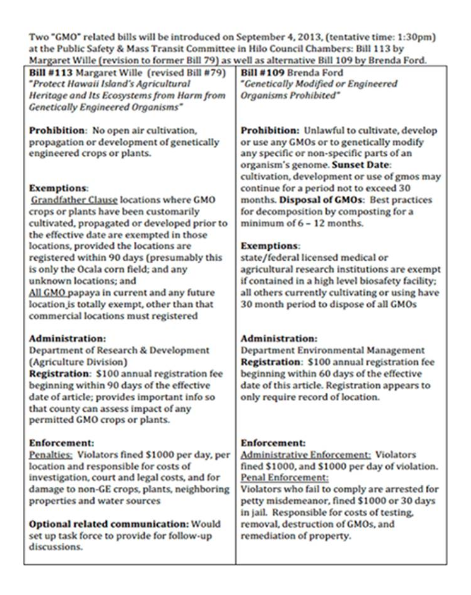Richard Ha writes:
I attended the anti-GMO Hawai‘i County Council meeting yesterday. I was there from 1:30 p.m., when it started, until the last testimony was heard at 6:30 p.m.
Tomorrow, the County Council begins discussing the two bills at the committee stage. If a bill is passed out by the committee, it would go to the full Council for two affirmative votes before passing into law.
My impressions of yesterday’s meeting:
The atmosphere this time was much more civil than last time around, and there were less than half the numbers of people on both sides. People testifying were more than 2-to-1 on the anti-GMO side.
It was my impression, though, that the people testifying pro-GMO (against the anti-GMO bills) produce 50 times more of the island’s food than do the people testifying against it.
Farmers pointed out that this ban only affects Big Island farmers, and that therefore their competitors would have a cost advantage. They asked how is it possible that farmers would become criminals for farming.
Papaya farmers said they want to see proof that papayas are unsafe. They said an exemption for papaya farmers is meaningless.
The anti-GMO side mostly talked about the safety of eating GMO food. They were also concerned about pesticide usage, large companies and pollen contamination.
As someone who traded chicken manure for banana keiki to start our banana farm 35 years ago, I have a unique view of agriculture. The rules and regulations nowadays make it much harder for new farmers to get started. I have watched business cycles come and
go, and lived with the effects of the key cost drivers.
To me, it is clear that the most important cost driver in our future will be energy cost. The effect of rising energy costs will be unlike anything I have seen in my 35 years of farming.
Relying on our natural resources, though, we can find a solution that will take care of all of us.
Retreating to the 1950s is not the right strategy.
Here is my testimony:
I am against both bills.
In the future, it’s all about energy. Oil price quadrupling over the last 10 years caused farmers’ costs to rise. As we all know, farmers are price takers, not price makers.
We are isolated and one of the least food-secure places in the world. How can we leverage our resources to find a competitive advantage.
We should leverage our sun energy.
Our location in the subtropics is both a plus and a minus. Plus, because we have constant sun, and a minus because weeds, insects and diseases thrive here.
- Imagine if we could insert the gene that makes sweet potatoes resistant to fungus into Russett potatoes. It would save 15 sprays per crop. And it would be a brand new source of food for the Big Island.
- What if we could develop crops that generate their own nitrogen from the air?
- What if we could develop peaches, pears, apples, cherries that can thrive in our climate?
- What if the crops we grow could repel insects?
These ideas are in various stages of development right now. They would leverage the plusses of our sunshine and decrease the minuses.
Less fertilizer, less pesticide, more food and more discretionary income would benefit organic and conventional farmers. If the farmers make money, the farmers will farm.
The result would be a lower cost of food for the “rubbah slippah” folks.
Two-thirds of our economy is consumer spending. If the rubbah slippah folks had extra money, they would spend and businesses would thrive. That would result in a better life for all of us; not just some of us.
Both these bills criminalize farmers. If farmers follow federal and state laws, they become criminals.
Criminalizing farmers is a new concept. Farmers were revered in Hawai‘i’s history.
We should not be in a rush. Hawai‘i has the longest life expectancy in the nation for seniors. Let’s take a step back and figure out what kind of society we want for future generations.
Let’s think about this very seriously before we throw our farmers under the bus.
Have a look, too, at this editorial that Big Island Video News ran:
Not all genetically modified foods the same, A blanket ban on
them would be misguided.

